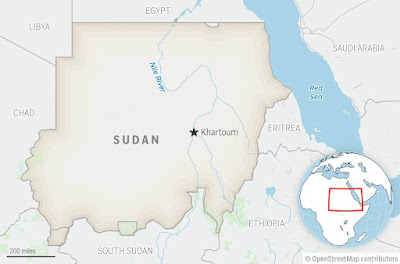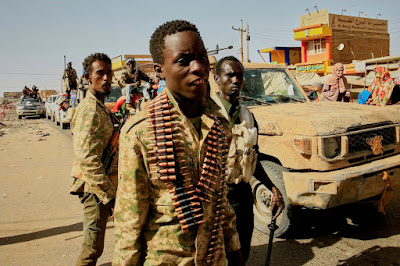From What's In Blue
Dated Mon 4 Aug 2025 - full copy:
Sudan: Closed Consultations
This afternoon (4 August), Security Council members will convene for closed consultations on Sudan. The meeting was requested by Denmark and the UK (the penholder on the file) to receive an update on the humanitarian and political situations in the country, specifically in light of the recent escalation of violence in North Darfur state and the Kordofan region. Personal Envoy of the Secretary-General for Sudan Ramtane Lamamra and UN High Commissioner for Human Rights Volker Türk are expected to brief.
Ahead of the meeting, Russia apparently objected to having an official from the Office of the UN High Commissioner for Human Rights (OHCHR) brief on Sudan, arguing that the office lacks the mandate to brief the Council on the issue. However, Denmark and the UK countered this argument, noting OHCHR’s strong presence in Port Sudan, as well as its access to nationwide networks and to parties to the conflict. They also argued that the Council should be able to draw on all relevant information to inform its work and cited precedents of briefings from OHCHR officials to the Council on other situations.
At this afternoon’s meeting, Lamamra is expected to provide an overview of the grave security situation in the country, amid spiralling and unabated violence. In recent months, North Darfur state and the Kordofan region have witnessed an alarming escalation in hostilities, with large numbers of civilians bearing the brunt of the fighting. Fierce clashes between the Sudanese Armed Forces (SAF) and the Rapid Support Forces (RSF) have continued, as both parties seek to consolidate territorial control. The fighting has been marked by heavy use of drones, artillery, ground operations, and airstrikes, exacerbating the humanitarian crisis and raising concerns about widespread violations of international humanitarian and human rights law. (For background and more information, see our 26 June What’s in Blue story.)
The Kordofan region has become a key flashpoint in the ongoing conflict due to its strategic importance as a crossroads linking the country from east to west and north to south. Control of the region is critical to shaping the balance of power in Sudan’s civil war. El-Obeid, the capital of North Kordofan state and a focal point of fighting, remains the SAF’s westernmost stronghold after it broke the RSF’s siege in February. The SAF reportedly uses El-Obeid as a base for launching airstrikes into Darfur and for preventing RSF advances towards Khartoum. Recent media reports have indicated an RSF mobilisation aimed at seizing El-Obeid.
In a 17 July statement, OHCHR noted that it had verified the killing of at least 60 civilians by the RSF in the Bara locality of North Kordofan since 10 July. Civil society groups have reported significantly higher figures, with some estimates placing the death toll at up to 300. The OHCHR statement added that at least 23 civilians were reportedly killed and over 30 injured in airstrikes carried out by the SAF on two villages in West Kordofan state between 10 and 14 July. Additionally, on 17 July, a SAF airstrike in the Bara locality killed at least 11 civilians.
In the same statement, Türk warned that a continued escalation of hostilities would worsen the already dire humanitarian situation and heighten risks to civilians. He urged those with influence to prevent such an escalation and to ensure that both parties uphold their obligations under international law, including to protect civilians and civilian infrastructure. Türk reiterated his call on the warring parties to ensure safe, sustained, and unimpeded access to humanitarian aid, including through humanitarian pauses. He stressed that alleged violations must be independently investigated and those responsible held accountable. This afternoon, the briefers and several Council members are likely to reiterate these messages.
Today’s meeting is also expected to take stock of recent political developments in Sudan. Kamil Eltayeb Idris—who has been appointed as Sudan’s prime minister by General Abdel Fattah al-Burhan, the SAF’s leader and chairperson of the Transitional Sovereignty Council—has continued appointing members to a recently established 22-member non-partisan technocratic government. Meanwhile, the RSF-led Sudan Founding Alliance (known as “Tasis”)—a coalition of rival armed and political groups, including the Sudan People’s Liberation Movement-North (SPLM-N) led by Abdelaziz al-Hilu, which controls territory in South Kordofan and Blue Nile states—announced in late July the formation of a parallel government in RSF-held areas. The structure includes a 15-member presidential council headed by the RSF’s leader, Mohamed Hamdan Dagalo, with Hilu serving as vice president and Mohamed Hassan al-Taishi as prime minister.
Several regional and international interlocutors have denounced the RSF’s decision to establish a parallel governing authority, warning that it risks entrenching Sudan’s political fragmentation, and have underscored the importance of upholding the country’s territorial integrity. In a 29 July press statement, members of the African Union (AU) Peace and Security Council (AUPSC) rejected the creation of the so-called “parallel government” and stressed that the AU only recognises the Transitional Sovereignty Council and the recently formed civilian transitional government, until consensual arrangements are reached to restore constitutional order.
Sudan has on multiple occasions expressed its desire to be readmitted to the AU, after having been suspended in the wake of the October 2021 military takeover. The AUPSC convened earlier today to consider the situation in Sudan, under the rotating presidency for the month of August of Algeria (an elected UN Security Council member in 2024-25).
Lamamra most recently briefed Council members in closed consultations on 27 June, providing an update on ongoing regional and international initiatives to resolve the crisis in Sudan. He apparently underscored the urgent need for a united and coordinated approach to address the crisis through immediate and concrete action. It seems that Lamamra also shared insights from the fourth consultative meeting on enhancing coordination among the various peace initiatives on Sudan, hosted and chaired by the European Union (EU) in Brussels a day earlier (26 June). The next round of the consultative meeting is expected to be held in Addis Ababa, although the date has yet to be determined.
At a tri-partite meeting in Baghdad in May, the leaders of the UN, AU, and the League of Arab States (LAS) agreed to maintain regular contact to better coordinate peace efforts in Sudan. The AU Chairperson’s special representative to Sudan, Mohamed Belaiche, visited Port Sudan last week, where he met with senior Sudanese officials, including Burhan and Idris. (For more information, see our 18 May and 26 June What’s in Blue stories.)
In recent months, the US has appeared to reinvigorate efforts to advance peace talks in Sudan, in coordination with regional and international partners. In early June, US Deputy Secretary of State Christopher Landau and Senior Advisor for Africa Massad Boulos convened a meeting on the Sudan conflict in Washington DC with the ambassadors to the US of the other Quad countries, namely Egypt, Saudi Arabia, and the United Arab Emirates (UAE). The US had also planned to host a high-level meeting of Quad foreign ministers on 29 July; however, according to media reports, the meeting was postponed indefinitely due to disagreements between Egypt and the UAE—who are said to support opposing sides in the conflict—over the language of a proposed joint statement. There have also been reports that the US rejected an Egyptian request to include representatives of Sudan’s government in the meeting. Separately, the Sudan conflict has featured in recent bilateral discussions between senior US officials and key interlocutors, including Egypt and Qatar.
Security Council members are currently negotiating a draft press statement, authored by the “A3 Plus” members (Algeria, Sierra Leone, Somalia, and Guyana) and the UK, that responds to the announcement made by the RSF-led Tasis alliance establishing a parallel governing authority. The draft press statement was open for comments until this morning. At the time of writing, members were awaiting a revised version of the text.
View original:
https://www.securitycouncilreport.org/whatsinblue/2025/08/sudan-closed-consultations-8.php
End

.jpeg)

.jpeg)

.jpeg)



